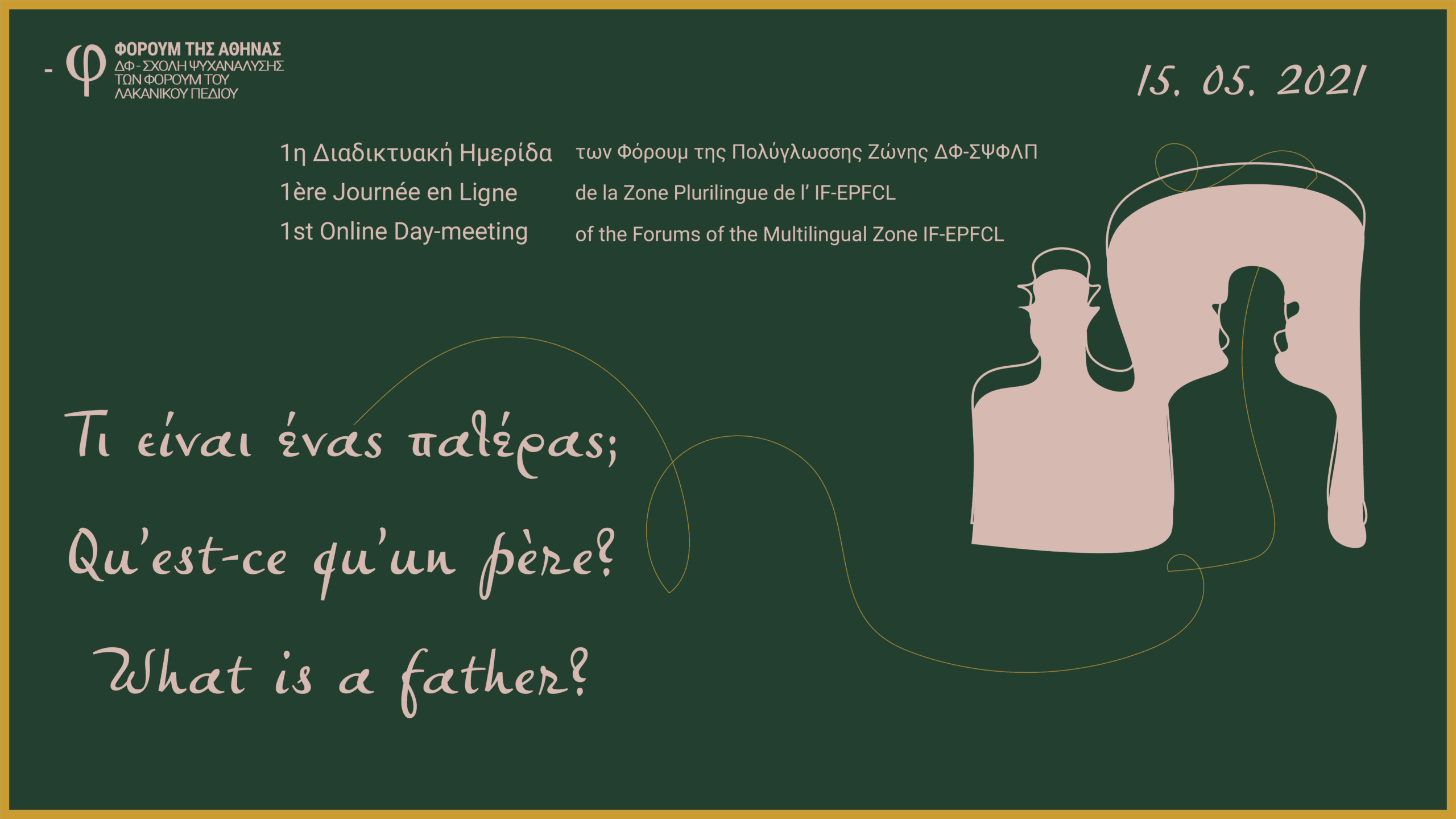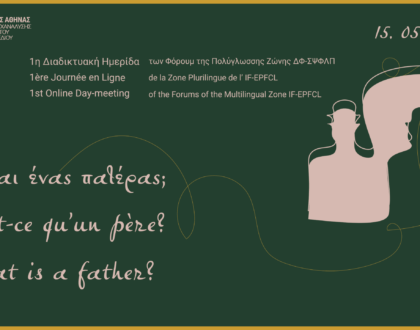Father of the Proper Name

Prelude FLF of Poland
1st online Day-Meeting of the Forums of the Multilingual Zone IF-EPFCL
The question “What is a father?”, proposed by the Forum of Athens as the theme of the first Plurilingual Zone Day, poses an ambitious challenge. First of all because of the very scope of the subject and the many changes throughout Lacan’s teaching on the function of the father. The question is whether we have a similar reading of it, especially since in the Plurilingual Zone we represent six Lacanian forums and one forum under formation from five countries (Greece, Lebanon, Poland, Romania and Turkey), where, compared to other zones of the IF-EPFCL, Lacan’s teaching seems to be the least available in mother tongue and least widespread among professionals interested in the mental life of subjects.
Given this and the fact that the Day will probably be a meeting with representatives of different psychological and psychiatric approaches, as well as other psychoanalytic currents, I have chosen to present the main lines of what in Lacan is at the antipodes of these other approaches in terms of the paternal function.
In 1963, Lacan proposed to link the function of the proper Name to the father [1] and since 1974 he continued his reflection on the function of nomination [2]. This definition disconnects the Name-of-the-Father function, therefore the naming father, from the real father. By distinguishing it, Lacan underlines the importance of this nominating function. Why? It seems that the first answer is that the nominating function allows the subject to link his enjoyment (fr. jouissance) to his desire by relying on language, which is important because, if unlinked, this jouissance causes confusion in the subject’s life. The goal of this function is therefore not to inscribe the subject in the social norm (nor to make him identify with his biological sex), because according to Lacan this is not what allows him to leave his position of a Nameless, as he qualifies the neurotic [3]. Despite his surname, the subject does not have a name of his own. With the nominating function, what is at stake is rather – this is the second answer – to produce a subject who can access a refined singularity. I will develop this point further.
The argument and the first prelude have already summarized the main elements and changes in Lacan’s thought about the paternal function, which allows me to relate to the signifier Name-of-the-Father. It is a signifier with symbolic determination, the lack of which for Lacan is the cause of psychosis [4]. However, he asserts from the start that the presence of this signifier coexists perfectly with the real absence of the father of the family[5].
Nor does the nomination function necessarily pass through the mediation of the real father. However, unlike the signifier Name-of-the-Father, the fact that the father is naming touches the real. This function of saying (fr. dire) has the status of an event, therefore of something that has or has not occurred. If the event has occurred, this function effectively ties the three consistencies (the real, the symbolic and the imaginary) in the Borromean manner. This results in the real subject which is no longer merely symbolically supposed in the chain of speech, but is referred to the real of the body [6]. The nominating function responds to the need for this real of the body to be tied to the mentality (fr. mentalité), failing which the subject is between delirium and autism. This mentality of the speaking being corresponds to the imaginary of RSI [7] and to the self-love that makes the subject adore his body [8]. Having a mentality means that there is a knot between the symbolic dimension, made up of the words and sounds of the language, and the imaginary dimension, which relates to the image of the body but does not reach the real of the body. Hence the need for the real to be tied to mentality by the function of nomination.
Nomination extends from the attribution of a common name to the attribution of a proper Name. This distinction was introduced by grammarians. The common name refers to all the individuals or objects belonging to the same category. It has a general meaning and an objective definition, such as “father”. As for the proper name, it makes it possible to distinguish the individual from the category to which he belongs; it therefore has no specific definition. The proper name refers to the individual and is exclusive to him. Freud gave us a shining example: with L’Homme aux Rats, a pseudonym aimed at protecting the patient’s privacy, he gave him a unique identity. This example shows how the symptom makes the proper name, a sort of singular signature, as with artists.
But where does this question of a Proper Name come from? According to Lacan’s teaching, it comes from the complex constitution of the subject and its two operations. For the subject to exist in the real, it is not enough for him to come into the world with the real of his body; he also needs a cause, because he is not its own cause. This cause is the effect of language; it is the master signifier that splits the subject apart. In the operation of alienation, the subject’s founding dependence on language is introduced, which allows him to attribute sense to himself. However, at the same time, representation by the signifier makes the subject disappear, because the signifier which produces the sens eclipses him. The murderous factor of alienation stems from the fact that by giving sens, the signifier deprives the subject of nonsense [9], hence the need for interpretation as equivocal, providing the movement that will revive him. The master signifier is the agent of the function of the unconscious, and when the subject has his master signifier, we can assume he also has existence. Due to the structure of language, the subject can only be represented by one signifier for another signifier, so he only appears eclipsed between the two signifiers. Always in search of his essence, in the operation of separation, second in establishing the cause of the subject, he finds his equivalence to what he is as a subject of the unconscious in the desire of the Other. He takes the place of the object of the Other’s demand – oral, anal, scopic and invoking – which constitutes an episodic substance of the object a, object without possible representation. The end of the analysis is, among other things, the end given to this equivalence which opens the subject into the void.
The proper Name refers to the fact that it is difficult for the subject to define himself by his signifiers. This name therefore appears where the subject faces the irreducible and infinite hole which is called the unconscious. Throughout the subject’s life, this hole is covered with identifications resulting from his links to few important Others. These identifications make life easier for him until the moment when they begin to produce his impotence. The experience of psychoanalysis strips the subject of these identifications on the condition that he is ready to face this, because not all subjects are. The proper Name is what tries to make up for this impotence of identification. This proper Name, unlike the patronymic, does not have a homonym.
But where does “the Father as a name” come from? According to Lacan, it is, at times, “spit out” through the hole of the unconscious, “having usually a habit of swallowing” [10]. What is thus named is everything that does not pass to the signifier, therefore the real, including the object. “A father worthy of the name”, by saying the name [fr. dire de nomination] of his objects – his children and his symptom-wife – brings them into the history of generations and into a non-anonymous desire that goes beyond reproduction of the bodies [11]. This is how his saying of nomination ties the real with the symbolic and the imaginary, it ties together the word in which the subject is represented, with the real of enjoyment which refers to his body. The names which respond to this lack of real predicate for the subject are Names of the Father which may well do without an actual father.
This knotting of the nomination must however be authenticated. This was also the case with the self-attribution of the name, the Artist, by Joyce [12], who otherwise had no father with the function of the nomination. Recognition by others (readers) thus inserted this subject with his proper name into the social bond.
Ultimately, Lacan reverses the matter and declares that the act of Naming is, in itself, the father [13]. Thus, anything that gives the Name that refers to the unconscious is called “father”. This thesis makes the real fathers subject to a more general function of nomination, hence the Names of the Father in the plural. Furthermore, the reference to the title of Name-of the-Father seems to emphasize the need to produce a name of jouissance with which the subject identifies [14].
The Name of the Father – which, according to Lacan can be, “as in the Borromean knot, [in] indefinite number” [15] – is not a proper Name in itself, but a function of the unconscious. Thus, “a father-symptom” [16] has a proper name, but has no function. The names of the Names of the Father are not gendered, for there is no sexual relation and our enjoyment is based on the objects of the surplus-enjoyment. Clinical experience drawn from psychoanalysis and other sources (Joyce) led Lacan to conclude that the Name-of-the-Father function is contingent, therefore impossible to program by specific recommendations given to parents and fathers in particular. It is also disjointed from the family (whatever its status: conjugal life, partnership or cohabitation), sexuation and reproduction. This perspective allows us not to become attached to heteronormativity, neither with regard to sexuality nor with regard to the paternal figure [17].
It still poses at least one question for our debate: what does this change for us in our practice of psychoanalysis, in interpretation for example?
Anna Wojakowska-Skiba,
Polish Forum of the Lacanian Field, Member of the EPFCL-France School
Bibliography:
[1] Lacan, J., Seminar Les Noms du Père which consists of a lecture from November 20, 1963, AFI Version.
[2] Lacan, J., Seminar R.S.I., Book XXII, 1974-1975, Version AFI, lecture of April 15, 1975 and May 13, 1975.
[3] Lacan, J., Subversion du sujet et dialectique du désir dans l’inconscient freudien, Écrits, Paris ; Seuil, 1966, p. 826.
[4] Lacan, J., Seminar L’insu que sait de l’une bévue s’aile à mourre. Livre XXIV, 1976-1977, Version Staferla Version, lecture of January 11, 1977.
[5] Lacan, J., Question préliminaire à tout traitement de la psychose (1957/58) , Écrits, Chapter IV : Du côté de Schreber, Paris: Éd. Du Seuil, 1966, p. 557.
[6] Soler, C., Lacan, l’inconscient reinvente, PUF, 2009, p. 13.
[7] Lacan, J., Seminar R.S.I., op. cit., lecture of March 11, 1975.
[8] Lacan, J., Seminar Sinthome, 1975 – 1976, Association Freudienne Version, lecture of January 13, 1976.
[9] Lacan, J., Position de l’inconscient, Les Ecrits, Seuil, 1996, pp. 835, 840-841, 844, 848-849.
[10] Lacan, J., Seminar R.S.I., op. cit., lecture of April 15, 1975.
[11] Lacan, J., Seminar R.S.I., op. cit., lecture of December 17, 1974, p. 65-66.
[12] From the title of his book of 1916, A Portrait of the Artist as a Young Man (Sinthome, lecture of November 18, 1975, January 13, 1976 and May 11, 1976).
[13] Lacan, J., Seminar R.S.I., op. cit., lecture of March 11, 1975.
[14] Izcovich, L. Du Nom-du-Père au père qui nomme, Champ lacanien, vol. 3, no. 1, 2006, pp. 23-31.
[15] Lacan, J., Seminar R.S.I., op. cit., lecture of April 15, 1975.
[16] Lacan, J., Seminar R.S.I., op. cit., lecture of January 21, 1975 r.
[17] Soler, C., Nomination et contingence, Champ lacanien, vol. 3, no. 1, 2006, pp. 13-19

